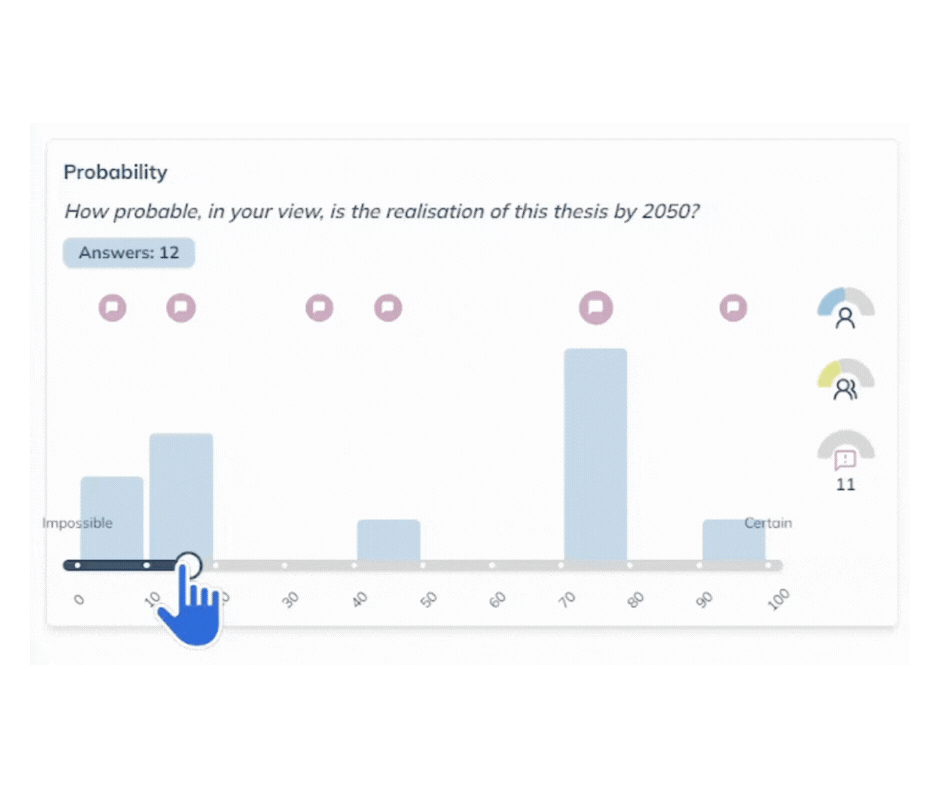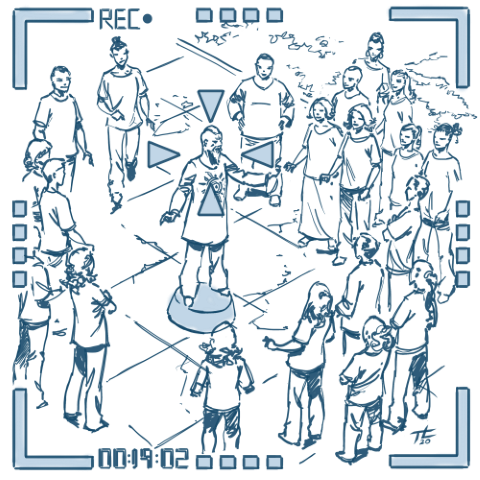15 common misconceptions about Delphi and Real-Time Delphi

The Delphi method is a widely respected technique for structuring expert dialogue and harnessing collective intelligence. Its ability to foster reasoned consensus on complex topics makes it invaluable in fields from policy planning to business strategy. However, like many established methods, Delphi is surrounded by misconceptions, often stemming from experiences with its older, traditional format or with poorly implemented modern versions. Let’s debunk some common myths about Delphi and its dynamic evolution, Real-Time Delphi (RTD), to clarify its true capabilities today.
Common Delphi and RTD misconceptions
-
Myth: Delphi is always slow and time-consuming
Reality: This was largely true for classic Multi-Round Delphi (MRD), where weeks or months could pass between rounds waiting for manual analysis and feedback. However, Real-Time Delphi (RTD) radically changes this. With immediate feedback loops and continuous participation windows, RTD studies can often be completed 1-3 weeks (or even a day in some cases!), making the process significantly more efficient for both participants and organizers.
-
Myth: Delphi is logistically complicated to run
Reality: Again, this perception often stems from the early implementations of the Delphi method (paper-and-pencil, email-based or outdated online platforms), which required intensive manual effort for distribution, collection, analysis, and feedback reporting. Modern, dedicated RTD platforms automate much of this. Setting up a study on an intuitive platform isn’t drastically more complex than setting up a standard online survey, though careful design is still crucial. Platforms like 4CF Halnyx 2.0 are specifically designed for ease of use for both administrators and participants.
-
Myth: Delphi is only for highly complex, serious academic research
Reality: While excellent for deep research, the efficiency and accessibility of modern RTD make it highly versatile. It’s increasingly used for agile applications like rapid expert polling on emerging issues, quick consensus building for strategic decisions within organizations, interactive stakeholder consultations, and even educational purposes. Next-generation RTD platforms make Delphi adaptable to various scales and timeframes.
-
Myth: RTD is faster but fundamentally limited compared to classic Delphi
Reality: This held a lot of truth for early, basic RTD implementations. However, modern, next-generation RTD platforms don’t just streamline the Delphi process; they enhance it. Features for effortless reasoning exploration, dynamic interaction, and intelligent guidance allow for a deeper level of understanding and collaborative refinement than often achievable in the fragmented MRD format. Research also suggests well-conducted RTD yields results comparable in quality to classic Delphi, but far more efficiently. Advanced RTD elevates, rather than limits, the Delphi potential.
-
Myth: Delphi is only effective with small expert panels [Bonus misconception: Delphi is only effective with very large panels]
Reality: Delphi, especially RTD facilitated by modern platforms, is remarkably flexible regarding panel size. While classic Delphi could become unwieldy with large numbers, RTD platforms can comfortably handle anywhere from a small handful of participants to hundreds or even thousands, depending on the study’s goals. The key is appropriate platform design and facilitation, not an arbitrary number. A good platform works well across scales.
-
Myth: Delphi is only useful for forecasting or making predictions
Reality: While forecasting was its origin, Delphi is now used for a vast range of applications, including: identifying priorities, developing guidelines or policies, exploring complex issues from multiple perspectives, evaluating options, building shared understanding among diverse stakeholders, and strategic planning. Its core strength is structuring judgment and reasoning, not just prediction.
-
Myth: Delphi is designed to force consensus
Reality: This is a fundamental misunderstanding, though poorly designed studies or platforms can inadvertently create pressure to conform. The true essence of Delphi is facilitating learning and deep understanding of a complex issue through exposure to diverse, reasoned perspectives. The goal is informed consensus built on shared understanding and integrated rationales, not simply statistical convergence around a mean or artificial agreement. A well-run Delphi values exploring disagreement constructively.
-
Myth: Outlier opinions get lost or ignored in Delphi
Reality: A well-designed Delphi process, especially on a modern platform, should make outlier opinions more visible and easier to consider than in unstructured discussions. While basic platforms might obscure them with simple averages or long comment lists, modern tools like 4CF Halnyx 2.0 use visualizations and filtering to highlight the full spectrum of views and make it easy to access the reasoning behind minority or diverging viewpoints. Delphi aims to consider all reasoned input, not suppress it.
-
Myth: Delphi’s role diminishes in the age of AI
Reality: As argued in the article Why Delphi is essential for navigating the AI revolution, the opposite is true. AI’s ability to generate vast amounts of information and potential solutions increases the need for robust human processes like Delphi to interpret findings, provide ethical guidance, align strategies with human values, and build consensus on how to use AI responsibly. Delphi is now more important than ever, for human wisdom to guide artificial power.
-
Myth: Delphi results are just averaged opinions
Reality: This ignores the iterative nature and the critical role of qualitative reasoning. Participants don’t just vote; they provide justifications, see others’ reasoning, reflect, and revise their views. The final output reflects this learning process and synthesis of arguments, making it far richer than a simple average of initial opinions – unlike regular surveys, Delphi cultivates true understanding.
-
Myth: Any online survey tool can run a Delphi study
Reality: While you can theoretically try to force a Delphi process using generic survey tools, spreadsheets, or email, it’s an extremely inefficient, tedious, and ultimately ineffective approach compared to using a dedicated platform. Manually managing anonymity, tracking participant revisions across rounds (MRD), compiling statistical feedback, synthesizing qualitative comments, and distributing results is incredibly burdensome for organizers and results in a clunky, disjointed experience for participants, especially lacking the real-time feedback crucial for modern RTD. More importantly, standard tools inherently lack the integrated features for structured feedback, dynamic indicators needed to focus attention where it’s most needed, and effective exploration of qualitative reasoning. Attempting Delphi with inadequate tools leads to a process that is merely a shadow of the insightful, dynamic engagement possible with purpose-built, modern systems. Do: Use modern, dedicated Delphi platforms, like 4CF Halnyx 2.0, designed with the necessary features to automate complexities and facilitate deep understanding effectively – all in a very user friendly manner.
-
Myth: Delphi is purely quantitative
Reality: While quantitative ratings are common, in a modern platform they are not the only supported option. Also, qualitative justifications are arguably the most valuable part of a Delphi study, regardless of the assessment type. They provide the context, nuance, assumptions, and depth of insight. Ignoring the qualitative aspect means missing the core value.
-
Myth: Anonymity means no accountability
Reality: Anonymity applies to participants knowing each other’s identities, fostering candor. It doesn’t mean the process lacks accountability. The facilitator is accountable for running the process correctly, participants are accountable for thoughtful contributions (often reminded of this), and the methodology itself provides a traceable structure.
-
Myth: Facilitation is less important with automated RTD platforms
Reality: While platforms automate many mechanics (calculations, feedback display), skilled human facilitation remains crucial for designing the study well (clear questions, appropriate panel), monitoring the process and especially for the nuanced analysis and synthesis of both quantitative and qualitative results.
-
Myth: Delphi guarantees a ‘correct’ answer
Reality: Delphi is a process for structuring judgment and exploring complex issues under uncertainty. It aims for well-reasoned, informed consensus or clarification of diverse perspectives, not absolute truth. Like any method involving human judgment, the outcome’s quality depends on the expertise involved, the rigor of the process and the quality of the tools used.
Understanding modern Delphi
Many misconceptions about Delphi stem from outdated views based on its original, slower format or from experiences with basic online tools that fail to capture its true, interactive potential. Modern Real-Time Delphi, facilitated by advanced, user-centric platforms like 4CF Halnyx 2.0, is a flexible, efficient, and profoundly powerful method for cultivating deep understanding and informed consensus. By moving past the myths and embracing best practices with the right tools, organizations can unlock the full potential of collective intelligence to navigate complexity and make better decisions.

Experience the next generation of Delphi
4CF Halnyx 2.0 provides the intuitive, powerful, and insight-focused platform needed to conduct effective Real-Time Delphi studies that deliver meaningful results.
Interested in Delphi and RTD? Explore our expert series:
4CF Delphi Expert Series offers comprehensive insights, drawing on extensive experience, covering everything from the fundamentals to advanced applications and the crucial role of next-generation platforms. Whether you're new to Delphi or an experienced practitioner, explore these articles to deepen your knowledge and enhance your results.






Explored these? Discover even more in our full Delphi series
Interested in Delphi and RTD? Explore our expert series:
4CF Delphi Expert Series offers comprehensive insights, drawing on extensive experience, covering everything from the fundamentals to advanced applications and the crucial role of next-generation platforms. Whether you're new to Delphi or an experienced practitioner, explore these articles to deepen your knowledge and enhance your results.
Explored these? Discover even more in our full Delphi series
Stay updated! Subscribe to our newsletter:
By subscribing to our newsletter, you consent to the processing of the provided data. The data controller is 4CF Sp. z o.o., its registered office is located in Warsaw, 10/14 Trzech Krzyży Square, postal code: 00-499.
We process your data solely for the purpose of sending information about 4CF Sp. z o.o. and its activities via e-mail. Your data will be processed until your consent is revoked through a link that will be included in each newsletter. The withdrawal of consent shall not affect the lawfulness of processing based on consent before its withdrawal. Providing your data is voluntary, but necessary if you wish to receive information about 4CF Sp. z o.o. and its activities. We may transfer the data to our suppliers of services related to the processing of personal data, e.g. IT service providers. Such entities process data on the basis of a contract with our company and only in accordance with our instructions. You have the right to request access to your personal data, its rectification, deletion or limitation of processing, as well as the right to lodge a complaint with the supervisory authority. More information about your rights and about the processing of your personal data can be found in our privacy policy.







